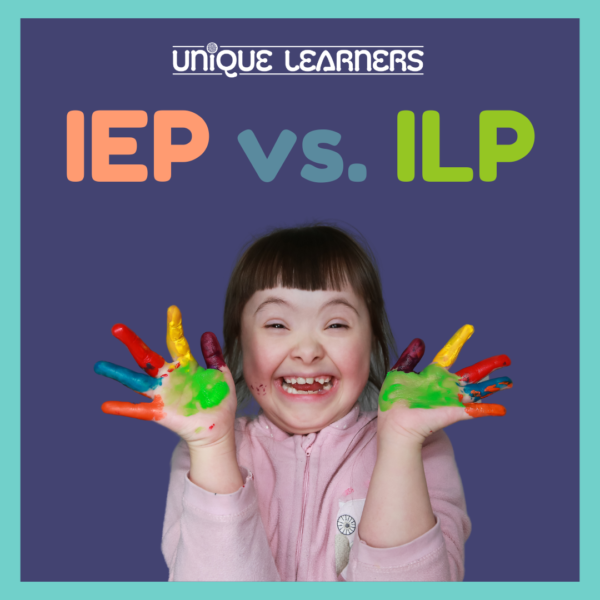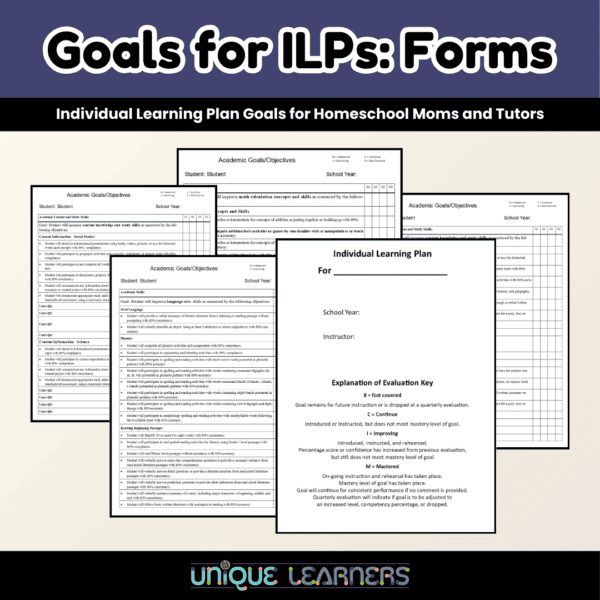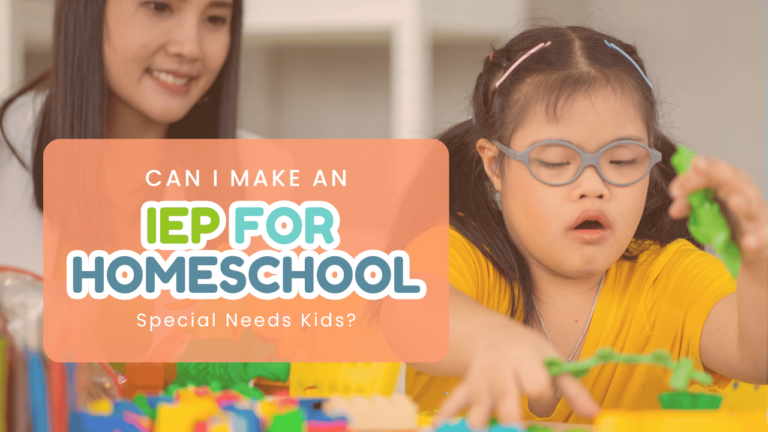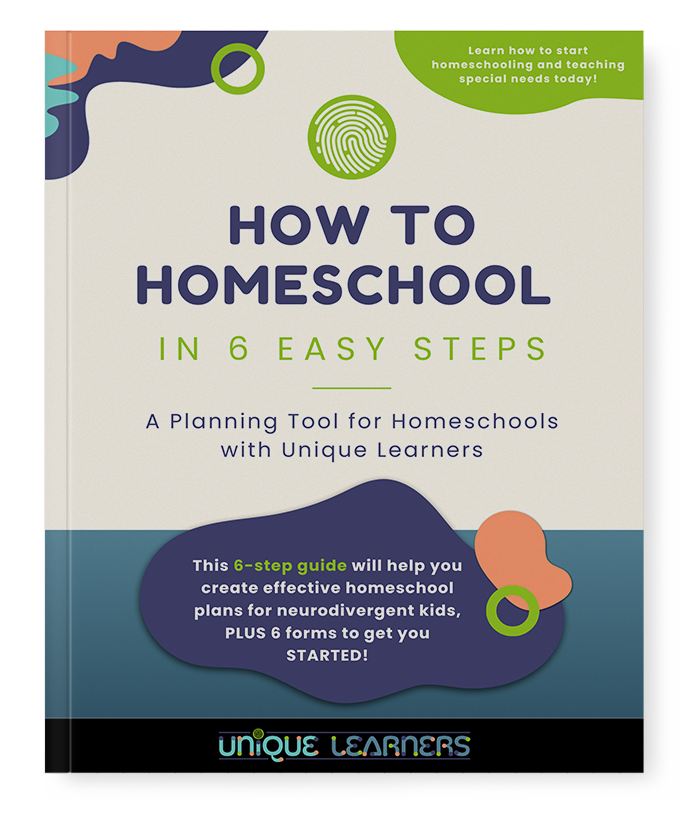So you’ve decided to homeschool your child with special learning needs, but now you are wondering what happens to their IEP or if you can make your own IEP for homeschool. The answer is a bit complicated. First, you need to understand the difference in terminology between an Individual Education Plan (IEP) and an Individual Learning Plan (ILP). Then the answer will start to make sense.
An Individual Education Plan (IEP) is a legal document used exclusively by publicly funded schools – public and charter schools. An IEP summarizes an assessment completed by the school to determine if your child qualifies for any type of support services.
Sometimes schools will accept an assessment administered by a neuropsychologist; however, most schools want the evaluation to be conducted in-house by the school psychologist.
Each state or school district has a formula or criteria that is used to determine if the student need explicit, specialized instruction. That typically means that the student is at least 2 standard deviations below the mean on the standardized tests that are part of the assessment. Usually that ends up being 2 grade levels or more behind in English language arts or math. If a student is not so far behind, often the school will give the student support through a Title 1 or by providing a 504 Plan for accommodations and modifications in the general education classroom.
Once a student’s level of need is determined, the rest of the IEP is developed. Goals are written for each subject the student will receive services in. The amount of time weekly, who will be involved with the student, what types of specialized instruction, and any further services will be outlined. A meeting is held to go through the IEP and to get parent approval.
Only once the IEP is signed can the child begin to receive services because the contract is now in effect. But does that mean your child is going to receive an individualized program? Possibly. Possibly not.

So what is the difference between an IEP and an ILP?
IEPs are provided under Public Law 94-142 which ensures that students with special needs have a right to a free and appropriate public education (FAPE) in the least restrictive environment (LRE). As soon as the parent decides to choose a different option than through a public school (or charter school that receives public funding), the lines become blurry.
Depending on your state and/or school district, students in private schools and homeschools MAY continue to receive special education and speech/language therapy through the public school system. The requirements for these services may be restricted to on school grounds or after regular school hours. You will need to inquire as to your own local requirements.
An Individual Learning Plan (ILP) is a document that may be similar in content to an IEP. It also may be a simple listing of goals that a private service provider intends to work on with your child. The plan may also be derived from your homeschool curriculum or your own goals for your child for the school year. An ILP may have one to five goals or several pages of very detailed objectives. The goals do not have to be all at the same grade level; however, they should be written in SMART goal format for easier monitoring of progress.
An ILP is NOT a legal document to be upheld in court.
Most of the time, when parents decide to homeschool, they have also decided to take on the responsibility as case manager and primary teacher for their child’s education. The student does not need to qualify for help. You can provide the instruction or hire a teacher or tutor for certain subjects. It is YOUR plan, not one developed by a child study team. An ILP can be a good substitute or alternative format for a homeschool report card.
Those of us who are parents of unique learners know that their progress may take a different pace or pathway compared to neurotypical kids. Having an ILP can make it so much easier to celebrate those little successes throughout the year.
Your plan can take any format you want. You can evaluate progress toward mastery of goals as often as you like. You can revise the goals, write new ones, or eliminate goals that have been mastered any time during the year rather than waiting for that once a year IEP review meeting.
It is important to note that if you ever decide to send your child back to public school, the IEP is likely to be expired. You will need to go through the entire qualifying process with an updated assessment and a renewal IEP. Many parents do not realize that when they choose to homeschool, they are waiving the right to specialized services for their child.
If you want to continue to access the services in an IEP, I would highly suggest checking with a special education attorney and/or asking your local school district what the policies are for homeschooled kids who are currently on an active IEP.
After high school, you may want accommodations and modifications in college for your teen. My experience has been that colleges did not ask for an IEP or an ILP. They wanted proof of an official diagnostic label within the most recent 3 years. In practicality, if you are seeking special services from a disability office at college, you will want to update your child’s diagnostic assessment between 10th and 12th grade by a licensed neuropsychologist, clinical psychologist, or educational psychologist.
Here is a great resource for finding special education goals that you can use in your ILP.
https://www.bridges4kids.org/IEP/iep.goal.bank.pdf
Many schools use IEP development software, such as IEP-Pro. Since an ILP is not a legal document, your ILP can be in any format you want. Here is a source for various forms that you can download from a public school that can help you in setting up a special needs homeschool.
https://sites.google.com/sbcsc.k12.in.us/special-edhome-page/iep-forms

Sue at Unique Learners can also help you develop an ILP for your own homeschool. She has many forms and can assist in helping you match curriculum to your child’s learning profile and set SMART goals that will help you see progress. Kids love to celebrate their successes in learning, and having an ILP in your homeschool can reveal those steps toward bigger gains! Check out the “Goals for ILPs: Forms” product from the shop to help you make an ILP designed for your child’s specific learning needs!
Want to know about new products and blogs?
Are you new to homeschooling, or just wanting a fresh start? Download our FREE “How to Homeschool in 6 Easy Steps” guide and get valuable insights from Sue’s 30+ years of experience as a special educator and homeschool mom of 4!
Also, join our Facebook group!
Join our new “Homeschool Help for Special Needs” Facebook group! It is a place for homeschool moms to ask questions about homeschooling a child with special learning needs, share teaching and curriculum ideas that have worked (and those that bombed), and be real about the unique challenges of homeschooling with special needs. If you want to join us, be sure to answer the member questions to help us keep this private group secure. Join us now!

